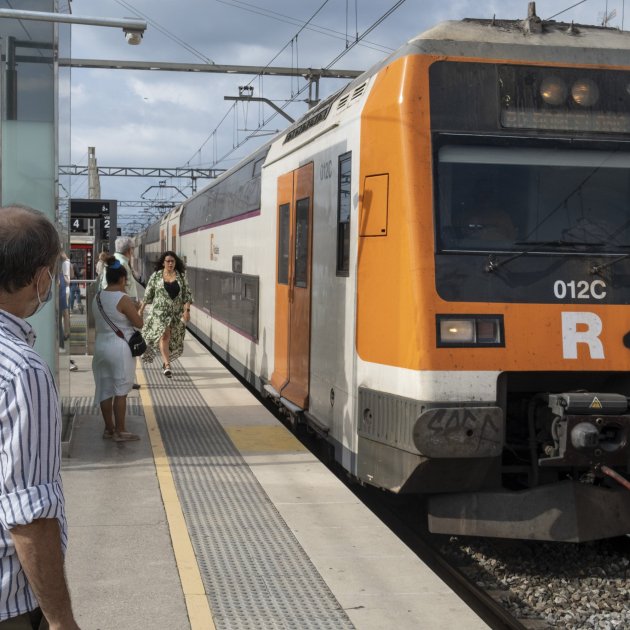It was not a great surprise to regular rail commuters when the news came on Monday night that Barcelona's R2 South suburban rail line had been put out of action by a technical problem. Catalonia's suburban services, the Rodalies, run by the Spanish operator Renfe on infrastructure owned by its sister company Adif, are notorious for their frequent service problems. But this one was more serious than usual. A fire that burned through a signal box near Gavà first caused the complete paralysis of the line on which tens of thousand of passengers travel daily, and was then followed by the announcement on Tuesday that the damage would cause services on the line to be drastically cut for up to month, and that the trains that do run will take longer. Spanish transport ministry secretary Xavier Flores said that the service would be "improved progressively" but could take between three and four weeks to be back to normal. "If it can be less, less." The Catalan government moved to set up bus services to reinforce the crippled rail line which connects the city to coastal towns such as Castelldefels, Sitges, Vilanova i la Geltrú, and Sant Vicenç de Calders. At Vilanova i la Geltrú alone, over 16,000 commuters get on or off every day. And all this on Rodalies, the rail service which the Spanish government promised to hand over to the Catalan authorities - a promise which hasn't been kept.
But a day further on, while thousand of commuters have to try and adapt to their new disrupted travel plans, there is a new protagonist in this conflictive drama: a supposed lightning strike. The infrastructure company Adif has claimed - and it maintained its theory in a meeting this Wednesday with the Catalan government - that lightning was the cause of the fire that affected the R2 South signaling system. This assertion was reiterated by Alfonso Ruiz, deputy director of Adif's North-East Operations, after meeting with representatives of the Generalitat to address the consequences of the damage caused.
From the Catalan government, the perspective is different. They believe that this serious incident is due to the lack of investment in the rail network, a recurrent claim of the Catalan administration, which Adif rejects. In the meeting with the Generalitat, Ruiz ruled out that the cause of the fire was the lack of investment in the railway network, as suggested by Marc Sanglas, the Catalan secretary of mobility. "This incident was absolutely impossible to predict," said the Adif manager. However, Sanglas regretted that Adif's explanations were "insufficient" and announced that the Catalan government will carry out its own audit to draw "its own conclusions" about the incident. The Generalitat has demanded that all stations on the R2 South have their service to and from Barcelona guaranteed at peak times. "It's a demand that we have raised before, but now it's more urgent than ever," said Sanglas.
Catalan met service shows up the 'lightning strike' claim
The hypothesis given by Adif and the Spanish transport ministry that lightning could have caused the Gavà incident is not supported by the weather professionals. According to the maps of Catalonia's Meteocat on Monday, there was no lightning in Gavà, or in the entire Baix Llobregat county. The few electrical disturbances in the atmosphere detected that night were far away from the signal box whose destruction by fire will affect this train line for weeks.
In fact, Meteocat has made a report, to which ElNacional.cat has had access, confirming that the Electrical Discharge Detection Network (XDDE) did not detect lightning in the Baix Llobregat county and, therefore, "there was no lightning in the municipality of Gavà or in the surrounding municipalities on May 1st". The report adds that the day before, on April 30th, storms did affect Baix Llobregat, but that "the lightning strike closest to the point of interest (Gavà train station) took place about 4.5 km away, in the municipality of Prat de Llobregat. Bearing in mind the precision localization of the system, any impact at the point of interest is ruled out".
Rodalies activates a reduced train schedule
The director of Rodalies, Mayte Castillo, has detailed that from this Thursday the operator will launch a complementary service from Castelldefels to Barcelona direct with 4-5 buses every half hour coinciding with rush hour, between 6am and approximately 9am, and another return trip between Barcelona Sants and Castelldefels and Gavà, between 5pm and 7pm. Travellers will be able to use their regular rail passes. The rail service that can be provided, with reduced technical means, consists of three trains per hour in each direction, which will make stops at all stations. That is around half the usual service, and since all trains stop at all stations, they are significantly slower.
